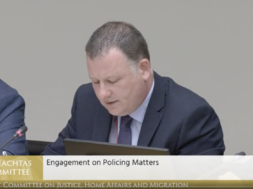Speech by Frances Fitzgerald T.D., Minister for Justice and Equality,
on Justice Reform, at the MacGill Summer School
21 July, 2014
Ladies and Gentlemen,
We talk a lot these days about reform.
But why reform?
Surely not just for the sake of reform;
But to keep apace with rapidly changing realities of life in contemporary Ireland.
Crime trends are changing just as social behaviours and technologies change.
What makes us feel unsafe or vulnerable may not be the same as before.
Our society is becoming more litigious.
More lay citizens are accessing the courts.
While the concept of justice may be fixed and of the ages….
Our conceptualisation of how justice works and applies itself does evolve.
So too the institutions and processes of justice must evolve.
For some institutions, there has been little evolution in preceding decades.
Staid concepts of court; and lingering Victorian concepts of the penal institution stand as examples.
But this Government has committed to justice reform…
As Minister, I am charged with leading this reform, advised by the new Cabinet Committee on Justice Reform chaired by An Taoiseach,
Last week the Oireachtas passed the bill to establish the new Court of Appeal; actioning the decision of the people; paving the way for the more efficient hearing of appeals and tacking the backlog in the Supreme Court. Justice delayed is justice denied. The Court of Appeal is justice reform in action.
We have seen a reduction in the numbers of persons imprisoned; and this will continue as we roll-out community return programmes and other new forms of supervised community sanctions; as well implementing the recently enacted Fines (Payment and Recovery) Act. This is justice reform in action.
Justice reform must also apply to policing.
Reform can be as exciting as it is challenging.
But when it comes to reforming an economy, or a health system or a police service, you need to be very careful that you do not confuse brutal assault with corrective action.
As the great philosopher-politician Edmund Burke might have warned: you do not want to destroy the totality in the attempt to fix individual elements.
That’s the situation I am in when it comes to An Garda Síochána.
What we have is a national body, with a proven and proud record, which is widely trusted to do a complex and constantly evolving task.
I want to stress that, lest it be assumed, when I criticise the structures or culture within the Guards – as I will today – that I am attacking the force in its entirety, which I am not. Let me say it again: We have a national policing body, with a proven and proud record, widely trusted, doing a complex and constantly evolving task.
That is the reality of An Garda Síochána and the contribution its members make to Irish life.
Their contribution to keeping our communities safe.
Their contribution to preserving the security of the State.
They do it all day, every day, and they never know the day that they will have a gun turned on them or a car driven at them. For that, our sincere gratitude should go to the men and women of An Garda Síochána.
Their contribution is further evidenced in the 2013 Garda annual report which I laid before the Oireachtas last week:
· their targeted approach (Operation Fiacla) has led to a 7% reduction in burglaries;
· the reduction in road deaths between 2005 & 2013 still remains more than 50%; with Garda targets for compliance with speed limits, wearing of seatbelts and drink driving enforcement all met in 2013;
· 260 organised crime gangs were targeted;
· 157 grow houses detected;
· 21,000 referrals to youth diversion programmes.
I could go on…
The totality of what Gardaí do is professional, good and necessary.
That does not permit us to ignore pockets of misconduct and cover-up.
On penalty points,
On crime investigation,
On responding to whistleblowers;
In some cases, what we have learned about the behaviour of members of An Garda Síochána has struck at the heart of our shared understanding of what justice itself is.
For we live in a republic….
A republic of laws…
Where there is not; and never can be, a situation of one law for some but not others.
Where all citizens are, and should always be, treated equally.
That is what we expect.
More importantly, that is what we are entitled to expect.
When we discover it not being delivered, we do not take it lying down.
Failure affronts us, and rightly so.
Failure has – in recent times – led to public controversy on a number of fronts.
As Minister for Justice, I want to see confidence trumping controversy.
· I want to see confidence restored in the work of An Garda Síochána;
· I want to see the men and women of An Garda Síochána fully supported in fulfilling their duties to keep our communities and country safe; and
· As I said, when I took office, I want to see a ‘sea-change’ in the performance, administration and oversight of justice and policing in this state.
For this reason, as you are aware, the Government has initiated a comprehensive programme of reform to address a wide range of systemic failings which have arisen in recent times, including on foot of the Guerin report.
· I will be bringing forward proposals to establish an Independent Garda Authority.
· I will shortly commence an international and open campaign to recruit a new Garda Commissioner.
· I have published new legislation to reform, strengthen and clarify the remit and operation of the Garda Síochána Ombudsman Commission, so as to ensure that the men and women of An Garda Síochána, as well as the wider public, can have the fullest confidence in its workings.
These reforms are vital. They are about providing a new architecture of openness and accountability in the administration and oversight of policing, as is only right in a modern day democracy.
But as important as these reforms are; we must not think that reforms to high-level management and oversight are enough.
Because, what is needed when it comes to justice reform, is not just ‘big ticket’ reforms; which in political terms might seem tempting due to their ‘optics’.
In 2005, we saw a new Garda Síochána Act, which DID contain some excellent ‘big ticket’ reforms:
· A new Ombudsman Commission – GSOC;
· A new Garda Inspectorate.
Significantly, the 2005 Act followed the last major crisis of confidence in the Gardaí. It emerged as a result of the Morris Tribunal – the Tribunal that investigated serious matters of misconduct in this very County. But it could be argued that it missed an opportunity to address more root-and-branch issues of basic policing which arose in Morris.
Now, I want to make it clear that I am not criticising the Act or those who framed it. That would be too easy – you know the old saying about hindsight giving 20/20 vision… and as I stated the 2005 Act did contain some excellent reforms.
The point I want to hammer home is this. In politics and in public administration, we sometimes substitute immediate action for comprehensive solutions.
That would be the danger, for example, implicit in the Guerin Report. Much of the commentary when it was published focussed on the response to whistleblowers’ allegations.
Important? Yes.
Urgent? Absolutely.
That it? No….
We must also pay attention to the report’s findings as they relate to the fundamental issues of how probationary Garda are supported and supervised and how Garda districts are managed and organised.
Justice reform requires much more comprehensive and sustained corrective action than has happened in recent times. It requires us to address ALL the relevant matters. It demands that we move beyond the ‘big ticket’ specific changes. Because the changes we really need are all-pervasive and at all levels. They are complex and deep-rooted.
The big ticket items include oversight, change management and the role of whistle-blowers. All of them are being addressed.
But the more subtle changes, the ones affecting all systems and the behaviour of every individual, include everything from local administration, to internal communications, from performance standards, to crime prevention, from culture to human resource management.
These are the bread and butter issues, which come into play, everyday, in every Garda district, every Garda unit.
And while I will be the first to welcome the many innovations implemented by the Gardaí in recent years and decades; I cannot be blind to the reality that, in some areas, the structure and culture have changed little.
As Minister I see my duty as one of grasping the challenge of deeper reform.
To move beyond the optics….
Well beyond the horizons of 2005…
To challenge and change… practices and structures.
To foster a culture which supports the effective working of all Gardaí;
To craft a policing service for 21st Century Ireland.
However – and this is important – I also see my duty as standing back from An Garda Síochána.
It is a curious thing: when a state agency hits a major problem, boundaries erode.
The temptation is for the Minister involved to step over those eroding boundaries.
To solve patent problems by direct intervention.
Not the right thing to do.
The right thing for the Minister for Justice to do is to lay down the non-negotiables: the standards, the directions, the absolute requirements of An Garda Síochána.
The wrong thing for the Minister for Justice to do is to make the decisions Garda management should make, informed by the input of every member of the force and – just as important – by the input and expectations of the public.
The right thing for the Minister to do is ask questions:
· Is the configuration of the police service right? Should it, for example, move from area-based sub-units, such as the current district model, to functionality or thematic based sub-units within each larger Garda division?
· Is the collection, analysis and presentation of crime statistics robust and reliable?
· Is there need for a new standards-led inspection approach to policing practice?
· Are sufficient supports in place to support trainee and probationary Gardaí; and to promote the continuing professional development of all members of the force?
Underneath every one of those questions – and, I would impertinently suggest, underlying every one of the questions you may raise this evening, is the broader question of how to make policing a proud and respected profession in 21st century Ireland – how to make it a life-long career while at the same time preventing the accretion of unexamined habits. Because it is the accretion of unexamined habits that, like barnacles on the underside of a boat, inhibit progress. It is the accretion of unexamined habits that adds up to a damaged and damaging culture.
In coming weeks and months I expect to receive substantial reports from the Garda Inspectorate on the investigation of serious crime by Gardaí; and a further report on the review of the force conducted on foot of the Haddington Road Agreement. I believe these reports will provide a foundation from which we can identify and drive reforms in basic policing; answering questions such as those I just posed; and addressing habits and cultures in a deliberative, constructive and transformative manner.
The Government can and will get the ‘big ticket’ reforms right:
With respect to GSOC;
With respect to establishing an independent new Authority;
With respect to opening up the appointment of the Garda Commissioner.
The Government can and will demand that An Garda Síochána at every level, challenges its own culture and faces up to the unexamined habits within the police service that may need to be stripped away.
So that the people of Ireland have a quality, effective policing service which they can be confident in;
So that the proud contribution of the men and women of An Garda Síochána; through their everyday policing, will stand recognised as a unyielding pillar of civic duty and integrity;
So that justice will be served.
For one and for all.
Always.









